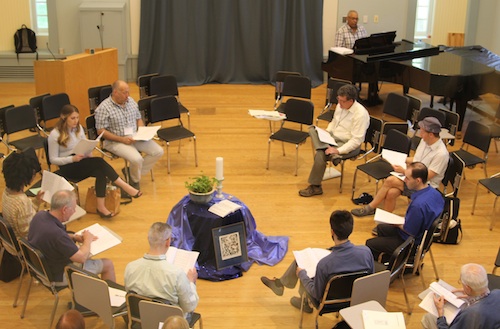
by Michael Racine, M.Div. ‘15
It’s September, 1990. Bill Carter has preached his first sermon—his audition, as it were—at the First Presbyterian Church of Clarks Summit, PA, and the congregation has just voted to accept him as their new pastor. Then a man in the congregation stands up. “We’ve heard you preach,” he says, “but would you play the piano for us?”
The question wouldn’t seem out of the blue if you were aware, as this congregant apparently was, that Bill Carter is a very capable jazz pianist as well as a minister of the gospel. But the young preacher replied, “Well, that’s not why I’m here; I’m here to be the pastor. We have a music staff, who are wonderful.” Prudent words, to be sure, from a fresh hire wanting to stick to his job description. But the congregant insisted: “Play something.”
“So,” Bill recalls, “I banged out Amazing Grace, with some alternate chords, in 4/4.”
“Play something else.”
The pastor obliged with one more tune, and then said, “But this is all I’m ever gonna do of this.”
The congregant’s pointed reply proved prophetic: “That’s what *you* think.”
In reality, the journey that would lead Bill Carter to the intersection of Christian liturgy and jazz had begun much earlier. It began when, at age fourteen, he picked up a book of sheet music that included a Duke Ellington tune called ‘Praise God’, as well as a Horace Silver tune called ‘The Preacher’. It had never dawned on Bill before that jazz music could be religious. Then, at age seventeen, he had his own religious experience while listening to Keith Jarrett’s Arbour Zena album. A series of similarly ecstatic moments followed while playing in jazz bands, but jazz remained outside of church until Bill went to seminary, and his internship supervisor asked him to put together a jazz service for Lent. At the time, Bill didn’t know why his supervisor wanted jazz for Lent. “But now,” he says, “I think I know.”
As a Presbyterian minister, Bill Carter’s life’s work centers on opening the Scriptures and responding to the pastoral needs of his congregation; still, it took a while for Bill to see just how musical the Bible is. Then he started looking closely at the book of Psalms, and it hit him: many of the “texts” in that book are labeled explicitly as songs—only, we’ve lost the tunes. But as a jazz man, Bill knows that music doesn’t live on the written page anyway; it’s made when people sing and play it. So, he stopped reading the psalms as preaching texts and started listening for the music they evoked. One year, on the fourth Sunday in Lent, the lectionary called for Psalm 137. And as Bill pondered the words of the psalm in preparation for his sermon, he thought: “That sounds to me to be a blues, in F minor.” So that’s how he presented it during the service.
Bill and his Presbybop Quartet have done a lot of jazz services since then, both in Clarks Summit and as guests at other congregations and church gatherings. First Presbyterian still thrives on classical choral music and hymnody most of the time, but something keeps bringing them back to jazz. As the team stated in their proposal for the Congregations Project, jazz is “a form of music that was birthed in experiences of oppression, deprivation, and brokenness.” These are not the types of experience that people often talk about in a “comfortably affluent” suburb like Clarks Summit, but the team sees the denial, bruises, and addictions in that community, even though they are hidden by “the social overlay of ‘the good life’ [which] prohibits many of the wounded from allowing their hurts to be exposed and dressed.” Music, they know, has a way of getting through that social veneer and speaking to people’s souls. And Psalm 137 is not the only blues in the church’s repertoire; in fact, many of the one hundred and fifty biblical psalms are songs of lament.
So Bill and his team intend to use those psalms, wedded to jazz arrangements which give vivid expression to their tones of both lament and praise, as catalysts for deep healing in their community. The plan is to develop and host a series of four healing liturgies over the coming year, each in the form of a jazz vespers and themed to address a particular type of brokenness: physical suffering; loss and grief; guilt, depression, and addiction; and broken relationships. These services will be held on Sunday afternoons, and the team hopes that many from the larger community will attend.
The task before then, besides ironing out the details of the liturgies themselves, is to prepare members of the Clarks Summit community for what they may hope to experience there. First Presbyterian is not a Pentecostal church, and when he speaks of “healing services” Bill Carter wants to be clear that people will not encounter snake-handling faith healers at these gatherings. What, then, should they expect? In short, to pray and be prayed for—in a variety of ways. They will find several stations around the sanctuary, where they will have the opportunity to share a communion meal and to be individually prayed for and anointed with oil if they choose. They can expect to sing, and they will also find instrumental music offered as prayer without words. From what this observer has seen of Bill and his team, they can expect their hearts to be opened as jazz music infuses loving and thoughtful pastoral care with something inherently moving and beautiful. And, let us pray, with hearts open they may experience God’s healing grace.